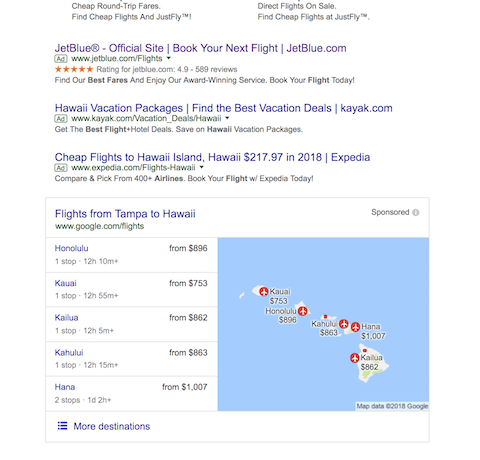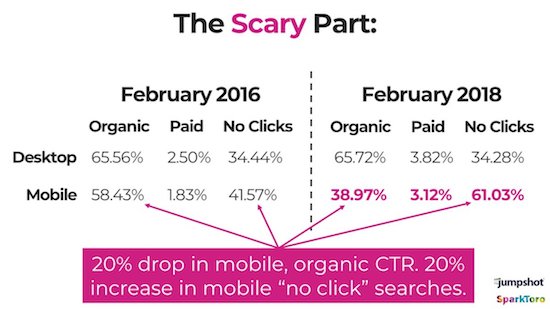May 25, 2018
We can all agree we probably ask ourselves some pretty standard questions every year, especially as Google enhances the SERP and new voice technology continues to rise:
- Are there more searches happening this year versus last year?
- Are search engines taking more search for themselves?
- Is search opportunity growing? Are clicks declining due to more competition and direct (answers) results showing in the SERP?
On a recent episode of “Liz & Sandro’s Marketing Podcast” they tackled some of these exact questions. While the focus was more for the SEO community, search is search and what affects one area, may affect other. Sandaro said, “More people are going to Google and doing more searches but less people are clicking on results. More people are finding, and Google is presenting answers on the SERP itself.” Can you remember the last time you searched for an event or flight and you didn’t have to click on anything to get what you need? Take a look at the most recent performed for “flights to Hawaii”.

Most of the information you need to make a decision is right on the first page. The flight, cost, and where to, a user doesn’t need to click on any paid or organic listings. Google offers more information, than even the paid ads sitting just above. So what does this mean? Has paid search been affected so much that users are not clicking on the ads and just leaving without. Well, not necessarily.
Most recently Rand Fishkin published a quick chart to show the increase of no-clicks on any search performed. The chart shows the decrease in organic clicks, and the increase in no-clicks, but what isn’t highlighted? The increase of paid clicks. In February 2016 only 1.83% of searched earned a paid click (this does not reflect the average CTR), but in February 2018, more then 3% of searches resulted in a paid clicks.

credit: sparktoro.com
This may not be a huge number, but what it does show is that users are gravitating toward paid search clicks and just reading the information they need on the first page.
We, in marketing, are (arguably) some of the most adaptable people and industry there is. Technology is changing every day, and so must our tactics and strategies to reach our ideal customer. In 2017, Purna Virji wrote about the evolutions of voice search (and what that means for PPC). Purna said, “It’s a massive opportunity, with 65% of smartphone owners using voice assistants. For PPC pros, the trick is understanding how to take advantage of this opportunity.” Here she highlighted the fact that we shouldn’t run away from these improvements, but rather embrace them.
So what’s next?
We know how to adjust ads to better match the search users are looking for. We can adjust text to questions, and seasonality. We can adjust to trends, but how do you serve an ad to someone who isn’t looking at a screen? That is a question that will puzzle strategists (and search engines) heading into this discipline of search. As the number of folks using voice search grows, the audience for individuals running paid campaigns will decline more than others based simply on the fact that there won’t be any screen or device to interact with, yet.
At first, the main use of voice search will be users speaking to their virtual assistants. (i.e. “Hey Google, book my hair appointment for Thursday.) We can’t include all mobile searches here, because there is still dictated search, which is very different from a true voice search. This only pertains to folks who are speaking to a device without holding it in their hands and with no screen to return results on — just two entities talking to one another like normal people and computers do.
Patrick Reinhart says, “What we will most likely see during the evolution of voice search is the novelty wearing off. Like the dusty Wii sitting in the corner of your basement, users will ultimately become bored and will need something new, which will force change.
Paid search may see a little bit of a flattening out during the initial year(s) of voice search, but ultimately it will offer new ways to advertise through people’s devices that they speak to in every corner of their lives, and I am not talking about phones.”

Voice commands will continue to become a larger part of smart devices as the internet of things (IoT) becomes more prevalent, which will lead to more devices being voice-enabled. Many of those devices will have screens and be ripe for campaign targeting, which will allow paid folks to reach new audiences outside of computers and phones — TVs, refrigerators, watches, cars, etc.
Conclusion
No matter what product you are currently using for advertising, whether it be Google Search, Facebook, etc. voice search and Google no-click searches will ultimately impact you in some way, shape, or form. Change isn’t always a bad thing, and it can bring larger opportunities for some, and larger hurdles for others. Many of the topics touched on here are real-time and real-life strategies you should consider as you research new ways to reach audiences. Get ahead of these areas of growth and present forward-thinking solutions today.